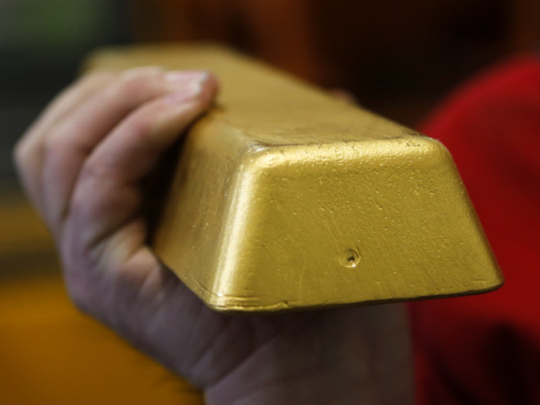
What just happened? The gold market started last week with its most violent downwards lurch in three decades. At one point the price of the world’s foremost store of value was down by a third from its peak less than two years ago. Why?
Explaining the timing and suddenness of gold’s fall is impossible. It is the nature of markets that trends can crystallise in sharp and violent moves. Many factors combined, with no single trigger.
It is far easier, however, to explain the reasons for its two-year decline. It is because investors have lost their fear that central banks are about to revive inflation, and because they now fear that the world economy will stagnate.
Why had gold risen so far? Starting in 1999 it rose sixfold, while the US stock market was flat. This was protection against uncertainty, and the risk that easy monetary policies unleashed after the 2000 dotcom crash and intensified after the 2008 financial crisis would lead to monetary debasement. When the supply of money rises, particularly in the US, the world’s biggest economy, gold will also tend to rise.
Even after last week’s calamity, anyone who bought gold the morning after Lehman Brothers fell in September 2008 and held it should still be happy: at its nadir last week it was up 73 per cent since then, double the total return on the S&P 500 index over the same period.
A bet on gold, then, is pessimistic, particularly about inflation. It also implies a view about interest rates. Gold pays no yield. Rising bond yields would make gold seem less attractive. Gold is a bet, then, that central banks will still intervene to keep bond yields down, and that these attempts will lead to inflation.
In line with this thesis, gold has rallied with new waves of “QE” (purchases of bonds by central banks to push their yields down, a form of printing money), and with new waves of concern about the financial crisis.
Inflation expectations
During the past few months, it was evident from several other markets that this thesis was being called into question. Inflation expectations in the US — derived from the gap between yields on fixed income and inflation-linked bonds — never rose above their post-crisis peak and started to decline. Narrow measures of money supply in the US have barely grown.
Globally, foreign exchange reserves (30 per cent of which are held by China) have fallen to their lowest level since 1999, just before the gold bull market started. Growth in reserves has — understandably — correlated with rising gold prices, so this was a sign that gold needed to fall.
Perhaps most importantly, commodities other than gold trended downwards. Since the Dow Jones-UBS commodities index hit a post-crisis high two years ago, it has shed 25 per cent. Industrial metals are down 32 per cent, and energy is down 30 per cent. Agricultural commodities have dropped almost 18 per cent (albeit with a sharp spike in 2012). Falling prices for such commodities can be a symptom either of rising supply (as in the case of energy, where shale gas has banished talk of “peak oil” for a generation), or of falling demand. They also have a self-fulfilling effect on inflation: if the prices of such raw materials are going down, then inflation will be less.
US stocks, of course, had a great start to the year, and hit all-time highs. That does not jar with fears of a slowdown. Except that on closer examination, the stock rally is limited to the US and Japan. Other markets are down. Within the US, gains are focused in defensive stocks that pay a high dividend. So the US stock performance looks like an outgrowth of the weird environment created by artificially low bond yields and investors are buying defensive US stocks as bond substitutes.
Little appetite
Now, look at the flow of news in recent weeks and months. Gold proved impervious to the Fed’s astonishing announcement last year of “QE Infinity” — indefinite bond purchases until employment begins to improve. It also failed to react to the extraordinarily aggressive monetary stimulus in Japan. And there was no great shock a month ago when the Cyprus situation threatened to inflame Europe again.
This told traders that there was little fresh appetite to buy gold. Whether the spark for the sudden sell-off was the news that Cyprus was selling its gold reserves, or the relatively unimpressive Chinese growth figures that were published on the same day, does not matter. The logic for a fall in gold had been assembled over many months.
— Financial Times












